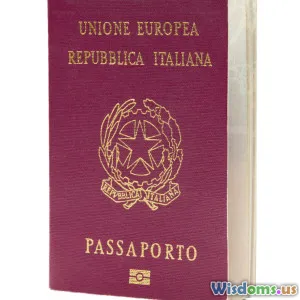
Unexpected Risks at All Inclusive Resorts Revealed
8 min read Discover hidden dangers at all-inclusive resorts and learn how to stay safe while enjoying your vacation. (0 Reviews)
Unexpected Risks at All-Inclusive Resorts Revealed
All-inclusive resorts often appear as the perfect holiday solution—flawless beaches, unlimited food and drinks, and a seamless experience packed into one price. They advertise ease and indulgence, alluring travelers looking for stress-free vacations. However, beneath this polished veneer lurk several unexpected risks that can compromise your wellbeing, enjoyment, and even finances.
This comprehensive article sheds light on these hidden dangers using examples, statistics, and insights from travel experts. By understanding these potential pitfalls, you’ll be better prepared to enjoy your all-inclusive getaway safely and wisely.
1. Health Hazards and Sanitation Concerns
Food Safety Risks
All-inclusive resorts serve vast quantities of food daily, often buffet-style. While this allows guests maximum choice, the sheer volume and variety increase the risk of foodborne illnesses. According to the CDC, nearly 48 million Americans contract foodborne illnesses annually, many linked to improper food handling and temperature controls—a risk amplified in busy resort kitchens.
For example, a popular Caribbean resort faced an outbreak of norovirus impacting hundreds of guests in 2018, traced to inadequately cleaned buffet surfaces. Norovirus is highly contagious and thrives in environments where food is prepared in bulk.
To mitigate risks:
- Always choose freshly prepared or cooked foods.
- Avoid raw or undercooked dishes, particularly seafood and eggs.
- Wash hands thoroughly before eating.
Water Quality Issues
Tap water at resorts may not meet the same safety standards as in developed countries. Contaminated water sources can lead to traveler’s diarrhea and other illnesses. Some resorts advise guests to stick to bottled water and avoid ice cubes made from local tap water.
Air Quality and Mold Exposure
In humid, tropical locations, all-inclusive resorts often struggle with mold growth within rooms and communal spaces, especially if maintenance is subpar. Prolonged exposure to mold spores can cause respiratory issues, allergies, and worsen asthma.
Travel experts recommend verifying the resort's maintenance standards and reading recent reviews mentioning cleanliness and air quality.
2. Safety Risks and Security Concerns
Crime and Theft
Though resort areas are generally secure, some all-inclusive destinations are located in regions with elevated crime rates. Resort guests have reported incidents of theft, pickpocketing, and even break-ins, especially when leaving rooms unsecured.
A notable case involved guests at a Mexican resort who experienced theft of personal belongings despite locked safes, suggesting insider collusion.
Tips to stay safe:
- Use hotel safes for valuables.
- Avoid displaying expensive items.
- Stay alert, especially when away from the resort’s secure perimeter.
Water Activities Hazards
Water sports and activities are staple attractions at these resorts. Unfortunately, inadequate safety oversight has sometimes led to accidents. In 2019, a snorkeler suffered injuries due to poorly maintained equipment and insufficient briefing on local marine hazards.
Always inspect rental equipment personally and heed all safety instructions. Resorts that have certified lifeguards and follow safety protocols reduce such risks.
Emergency Preparedness
Some resorts inadequately prepare for natural disasters like hurricanes, earthquakes, or fires. During the 2017 hurricane season, some Caribbean resorts lacked clear evacuation plans, causing chaos among stranded tourists.
Before booking, inquire about the resort’s emergency procedures and check government advisories for the region.
3. Financial and Contractual Pitfalls
Hidden Fees and Upcharges
The term “all-inclusive” can be misleading. While many services are covered, there are often hidden fees for premium dining, spa treatments, or certain excursions. For example, a traveler booked a week at an all-inclusive resort in the Dominican Republic only to find that top-shelf liquors, international calls, and specialty restaurants had extra charges totaling hundreds of dollars.
Always scrutinize the fine print and ask about specifics.
Cancellation and Refund Issues
In the face of unforeseen events like travel restrictions or personal emergencies, all-inclusive packages can be notoriously difficult to cancel or receive refunds for. COVID-19 pandemic exposed many travelers to financial loss due to rigid policies.
Opt for travel insurance covering trip interruption and cancellation.
4. Privacy Concerns and Data Security
Many resorts collect extensive personal and payment data. Unfortunately, some lack robust cybersecurity defenses. There have been reports, such as a 2020 incident in Southeast Asia, where guests' credit card details were compromised due to malware in the resort’s payment systems.
Furthermore, strict photo or video recording policies might be absent, potentially invading guest privacy during leisure activities.
To protect yourself, use virtual cards, avoid public Wi-Fi for sensitive transactions, and clarify resort privacy policies.
5. Environmental Impact and Ethical Considerations
Ecological Footprint
Large all-inclusive resorts consume vast resources and generate significant waste. Construction often disrupts fragile ecosystems, coral reefs, and local wildlife habitats, as seen in parts of Cancun and Bali.
Many travelers now look for eco-certified resorts that incorporate sustainability into their operations.
Local Community Effects
Economic dependency on tourism can disrupt communities. Jobs may be low-paying, and local businesses sometimes lose out to resort monopolies.
Conscious travelers should consider supporting resorts that invest in local culture and fair wages.
Conclusion
All-inclusive resorts remain appealing for their convenience and luxury, but understanding the associated risks is crucial to ensuring a fulfilling vacation. Health hazards like contaminated food and water, safety issues from crime or poorly supervised activities, covert financial charges, privacy threats, and environmental concerns all warrant careful attention.
Armed with this knowledge, travelers can ask the right questions, research responsibly, and implement precautionary measures—turning potential pitfalls into manageable risks. Ultimately, an informed vacationer is an empowered one, ready to savor the best an all-inclusive resort has to offer without unwelcome surprises.
Booking Checklist:
- Verify sanitation and food safety records.
- Research guest reviews on safety and maintenance.
- Confirm transparent pricing policies.
- Ask about emergency plans.
- Use travel insurance.
- Be mindful of environmental and ethical practices.
Your dream holiday deserves both delight and due diligence.
References:
- Centers for Disease Control and Prevention (CDC) Food Safety Facts
- World Tourism Organization Reports
- Local news reports on travel incidents
- Travel and tourism expert interviews
- Environmental Impact Assessments from destination NGOs
Rate the Post
User Reviews
Other posts in Travel Safety & Health
Popular Posts
















